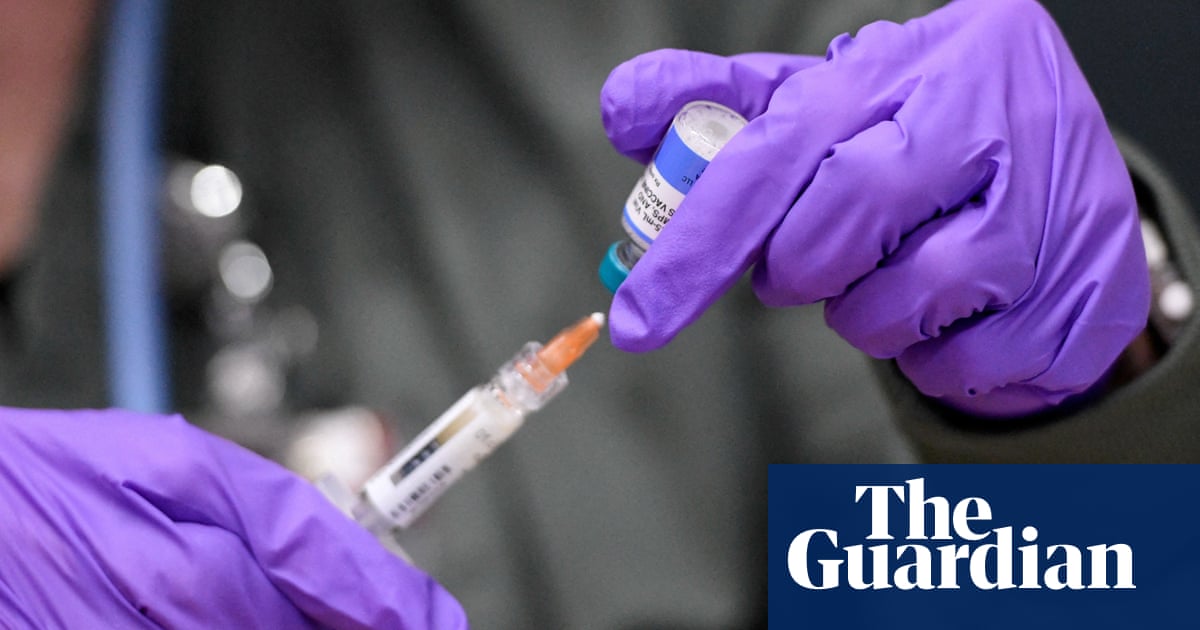A leading immunologist warned of a “post-herd-immunity world”, asmeaslesoutbreaks affect communities with low vaccination rates in the American south-west, Mexico and Canada.
The US is enduring the largest measles outbreak in aquarter-century. Centered in west Texas, the measles outbreak haskilledtwounvaccinated children and one adult and spread to neighboring states including New Mexico and Oklahoma.
“We’re living in a post-herd-immunity world. I think the measles outbreak proves that,” said Dr Paul Offit, an expert on infectious disease and immunology and director of the Vaccine Education Center at Children’s Hospital of Philadelphia.
“Measles – because it is the most contagious of the vaccine-preventable diseases, the most contagious human disease really – it is the first to come back.”
The US eliminated measles in 2000. Elimination status would be lost if the US had 12 months of sustained transmission of the virus. As of 1 May, the US Centers for Disease Control and Prevention (CDC)reported935 confirmed measles cases across30 jurisdictions.Nearly one in three children under five years old involved in the outbreak, or 285 young children, have been hospitalized.
Three large outbreaks in Canada, Mexico and the US now account for the overwhelming majority of roughly 2,300 measles cases across the World Health Organization’s six-country Americas region, according to the health authority’supdatethis week. Risk of measles is considered high in the Americas, and has grown 11-fold compared with 2024.
Only slightly behind, datareleased earlier this weekfrom the European Centre for Disease Prevention and Control (ECDC) and WHO also noted that measles cases across Europe were up tenfold in 2024 compared to 2023. That data also indicated that the 2024 measles cases in Europe followed a seasonal pattern, which was not previously noted in 2021 through 2023.
Of the European cases, which reportedly hit 35,212 for 2024, 87% were reported in Romania. The ECDC said the dip in vaccine rates has impacted the recent spike in measles, with only three countries, Hungary, Malta and Portugal, having coverage of 95% or more for both doses of the measles vaccine.
“This virus was imported, traveling country to country,” said Leticia Ruíz, the director of prevention and disease control in Chihuahua, Mexico, according to theAssociated Press.
Many cases are in areas with large populations of tight-knit Mennonite communities. The religious group has a history of migration through the American south-west,Mexicoand Canada.
Mennonite teaching does not explicitly prohibit immunization, according toan expertin the religion. However, as some in the Mennonite community in Texas resist assimilation and speak a dialect of Low German, community members may have limited contact with public health authorities, leading to lower vaccination rates.
Immunologists fear the rate of infection of such diseases – and the unnecessary suffering they bring – will increase as the US health secretary, Robert F Kennedy Jr, spreadsmisleading claimsabout vaccines and vaccine-preventable diseases,undermines public confidencein vaccines’ benefits, threatens to make some vaccines less accessible,guts publichealth infrastructureand pushesleading vaccine expertsout of the department.
The National Institutes of Health said it would launch a“universal” influenza vaccine trialwith $500m in funding, but the news comes as the administrationdisplays hostilitytowardCovid-19 vaccines.
“Here,Robert F Kennedy Jris exactly who he has been for the last 20 years. He’s an anti-vaccine activist, he is a science denialist and a conspiracy theorist,” said Offit.
“He has a fixed belief that vaccines are doing more harm than good – as he’s said over and over again.”
Although Kennedy has tepidly endorsed the measles, mumps and rubella (MMR) vaccine to prevent measles, he has also made false and inflammatory claims about the vaccine. Just this week, Kennedy told a crowd that it contains “aborted fetus debris”. The rubella vaccine, like many others, is produced usingdecades-old sterile fetal cell linesderived from two elective terminations in the 1960s.
Sign up toHeadlines US
Get the most important US headlines and highlights emailed direct to you every morning
after newsletter promotion
Kennedy’s health department also stated this week that it would implement new safety surveillance systems and approval requirements for vaccines, but did not provide any specifics about the design.
Experts saidrunning certain trials, such as for a decades-old vaccine like MMR, would be unethical because it could expose people to a dangerous disease when an intervention is known to be safe.
Kennedy recently visited the most affected community in Texas, centered in Gaines county, in his capacity as health secretary. There, he mademisleading claimsabout measles treatment, including that the antibiotic clarithromycin and steroid budesonide had led to “miraculous and instantaneous recovery”.
The overwhelming scientific consensus is that the best way to treat measles is through prevention with the MMR vaccine, which is 97% effective. Still, Kennedy has said he willask the CDCto study vitamins and drugs to treat the viral disease.
Measles is a virus. There is no cure for the viral disease and it is not considered “treatable” by leading physicians’ groups, such as theAmerican Academy of Pediatrics(AAP).
“There is no cure for measles, and it can result in serious complications. It’s misleading and dangerous to promote the idea that measles is easily treated using unproven and ineffective therapies like budesonide and clarithromycin,” the AAPhas saidof Kennedy’s claims.
Measles kills about one in 1,000 children who become infected with the disease, and has similar rates of brain swelling, called encephalitis, that can result in lifelong disability. Measles infectionsuppresses the immune system, which can lead to other infections.
Measles vaccination is believed to have saved more than93 million livesworldwide between 1974 and 2024 and reduced overall childhood mortality.
